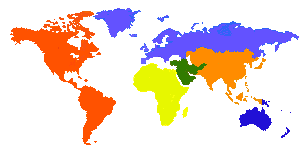|
UNAIDS
Established in 1994 by a resolution of the UNDP Economic and Social Council and launched in January 1996, UNAIDS is guided by a Programme Co-ordinating Board with representatives of 22 governments from all geographic regions, the UNAIDS Cosponsors, and five representatives of non governmental organisations (NGOs), including associations of people living with HIV/AIDS.
As
the leading advocate for world-wide action against HIV/AIDS, the global
mission of UNAIDS is to lead, strengthen and support an expanded response
to the epidemic that will:
UNAIDS brokers technical support and facilitates country-to-country sharing of experience, helping countries assess and strengthen their HIV-related efforts, and promoting the full engagement of civil society in the national response to AIDS. UNAIDS also supports countries in expanding access to the effective HIV treatments. The Joint Programme sponsored a research demonstrating the feasibility of prescribing antiretroviral drugs in poor countries, such as Côte d'Ivoire and Uganda. As a result of negotiations brokered by UNAIDS, antiretroviral prices have declined by more than 90% since 2001. It
also offers professional guidance and support to countries to initiate
and expand comprehensive care and treatment programmes for people
living with HIV. For example, in Malawi, UNAIDS is supporting national
efforts to expand voluntary counselling and testing, antiretroviral
treatment programmes, and services to prevent mother-to-child transmission.
UNAIDS is supported by donor and voluntary contributions governments, foundations, corporations, private groups(for example, students, universities, sporting clubs, etc.) and individuals. To contribute to UNAIDS, cheques can be made out to "UNAIDS" . Bank
transfers can also be made directly to the bank account to which all
contributions to UNAIDS are made. ESTIMATIONS MADE BY UNAIDS
|




